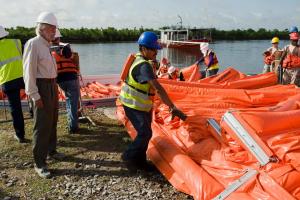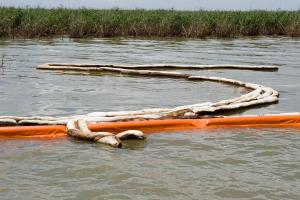Gulf Oil Spill: More than a Sea Change
 May 19, 2010
May 19, 2010In the midst of desperate attempts to stem the flow of oil and the agony of waiting to understand its effects, we are left with simple questions like what exactly is happening to the waters of the Gulf? And how quickly can we move from dependence on oil to a sustainable, renewable energy policy?
Absolutely no one knows the damage being done throughout the mile-deep water column. Crude oil and gas are gushing out at a few thousand pounds per square inch of pressure. These very complex chemicals hit ice-cold water and travel one mile up to the surface and warmer water. This is similar to an oil refinery process where temperature and pressure convert crude oil into all sorts of other compounds. What are those compounds? Which ones are toxic? Which ones dissolve in water, which sink and which come to the surface? I truly doubt anyone knows fully what is happening.
 On the subject of unknown chemicals, dispersants are being used in massive quantities. Dispersants are known to be harmful to aquatic life and some scientists believe that these chemicals are likely to be more harmful to organisms than is much of the oil. In addition, dispersants only disperse; they don't break down or detoxify. So, here we are adding more pollutants to an already massive amount of pollution. Why? Only to make the oil less visible!
On the subject of unknown chemicals, dispersants are being used in massive quantities. Dispersants are known to be harmful to aquatic life and some scientists believe that these chemicals are likely to be more harmful to organisms than is much of the oil. In addition, dispersants only disperse; they don't break down or detoxify. So, here we are adding more pollutants to an already massive amount of pollution. Why? Only to make the oil less visible!
We all know this is a catastrophe that should not have happened. We have not been prudent and we have not been diligent when it comes to oil drilling and extraction. The technology is limited and the oversight is inadequate. But now we have the consequences to live with.
I was at the Exxon Valdez 11-million-gallon oil spill and watched rocks being scrubbed and birds cleaned by 12,000 people using paper towels. Over 21 years later, we still hear stories of the ecological impact and lives forever changed, for the worse. Some estimates claim the Gulf spill may range from half that of the Exxon Valdez to the equivalent of the Valdez spill every four to seven days.
 Of course we’re alarmed, but the present hysteria angers me. How many times must we be surprised by the latest catastrophe? Will only a Doomsday event motivate us? It is crystal clear to me that we need to stand back and look at our attitudes and make fundamental changes. Crisis management is no management at all. Crises are absolutely inevitable if we continue to ignore the FACT that nature is far more complex and unpredictable than we can imagine.
Of course we’re alarmed, but the present hysteria angers me. How many times must we be surprised by the latest catastrophe? Will only a Doomsday event motivate us? It is crystal clear to me that we need to stand back and look at our attitudes and make fundamental changes. Crisis management is no management at all. Crises are absolutely inevitable if we continue to ignore the FACT that nature is far more complex and unpredictable than we can imagine.
We cannot change what has taken place but we must learn from it.
We must embrace a completely different perspective of how we work in, exploit and manage the natural world, far beyond simply the search for new technology. We need a new philosophy about the appropriate use of technology and our relationship with nature. We must remember that it is the natural world that keeps our planet habitable, and so far, most of our activities undermine the health and vitality of nature.
We need to come to terms with the fact that nature is far more complex than we understand and technology is far more limited than we want to believe. Knowing the world is unpredictable means that our technologies need to be designed with multiple safeguards and multiple back up systems. We need to anticipate the worst, plan everything to prevent it and then prepare another plan for when that prevention fails. Constantly being surprised by catastrophe is stupid because unpredictable events in nature are totally predictable.
Actually, the entire process of evolution is based on the certainty that unpredictable events will occur and that back-up systems need to be in place to ensure the business of staying alive continues. This is the lesson from 3.5 billion years of evolutionary progress. Diversity and redundancy are safeguards against change. In fact, the existence of sexual reproduction ensures that there are multiple back-up systems, manifested as each individual being slightly different, as our parent’s genetic information is combined in unique ways for whatever the future may hold.
 We all know that for now, we must stop the leak, clean up the mess, monitor the impacts, stay calm, and stick to the facts. We need to take care of the thousands and thousands of people whose lives are being destroyed in a domino effect, and make sure the political, industry and management people who were incompetent are held responsible economically and politically.
We all know that for now, we must stop the leak, clean up the mess, monitor the impacts, stay calm, and stick to the facts. We need to take care of the thousands and thousands of people whose lives are being destroyed in a domino effect, and make sure the political, industry and management people who were incompetent are held responsible economically and politically.
Finally, we need to accept the fact that some areas of our planet are too valuable and too risky for us to meddle in. I have spent much of my life on and in the sea. I know it well enough to know that I don't know it at all. It is unpredictable and powerful. Working in the ocean is dangerous business. At great depths, like a mile below the surface, it is beyond challenging. The pressure is otherworldly. The temperature approaches freezing, cold enough to make methane gas combine with water in the consistency of a smoothie. There is zero sunlight. This is close to an impossible environment in which to work. We knew this from the beginning. Agencies responsible for permits, to oversee technological security and back up systems, and BP itself, knew these challenges; sadly, the ultimate test of any proposed fail-safe system is sometimes the reality of a disaster. I believe drilling for oil in these regions is inappropriate across the globe, period.
Why would we treat the alien and hostile environment of the deep ocean with any less caution that we treat space, where we go only with multiple back-up systems?
We need to implement the precautionary principle, which requires the user to prove that any action taken will not cause harm. If we are not convinced, then the project should be stopped, whatever the profit. The Hippocratic oath, “First, do no harm,” must be applied a priori to our natural environment. When it comes to any action with a consequence to the environment, we must assume any industry is guilty until it proves itself innocent.
The Gulf of Mexico oil spill will be a tragedy of massive proportions to the natural world no matter what. Our only redemption is to make it the catalyst for a philosophical change that will protect us all in the future. For starters, in the meantime, we need an across the board inventory, from businesses and industry, to do what we can to reduce our need for oil.
No one has been harmed by extracting energy from sunshine and wind, tides, waves, currents, or from the temperature differential between warm surface and deep ocean water. In comparison, these seem risk-free. I, for one, am willing to take the chance.
To take action please:
To learn more please:
- Watch Videos From The Field
- Follow the OFS Team, in real time, at the front line of the Oil Spill
- Read How You Can Help
- Watch my Video Statement Gulf Oil Disaster
- Watch my PSA on Florida Oil Drilling
Warm regards,

First Photo: A small crab covered in crude oil rests on OFS Team Member Matt Ferraro's hand. Venice, LA © Carrie Vonderhaar, Ocean Futures Society
Second Photo: Aerial of Oil Spill area. Venice, LA May 13, 2010 Photo courtesy P.J.Hahn
Third Photo: Jean-Michel Cousteau at the hard boom staging station. St. Bernard Parish, LA © Carrie Vonderhaar, Ocean Futures Society
Fourth Photo: Oil saturated absorbent booms. Venice, LA © Carrie Vonderhaar, Ocean Futures Society
Donate to Two Futures Society
Yes! I want to support the field work, projects and mission of Jean-Michel Cousteau and the OFS team. Make a tax-deductible donation now!
Become a Member
Yes! Sign me up for a free membership!
Connect With Us